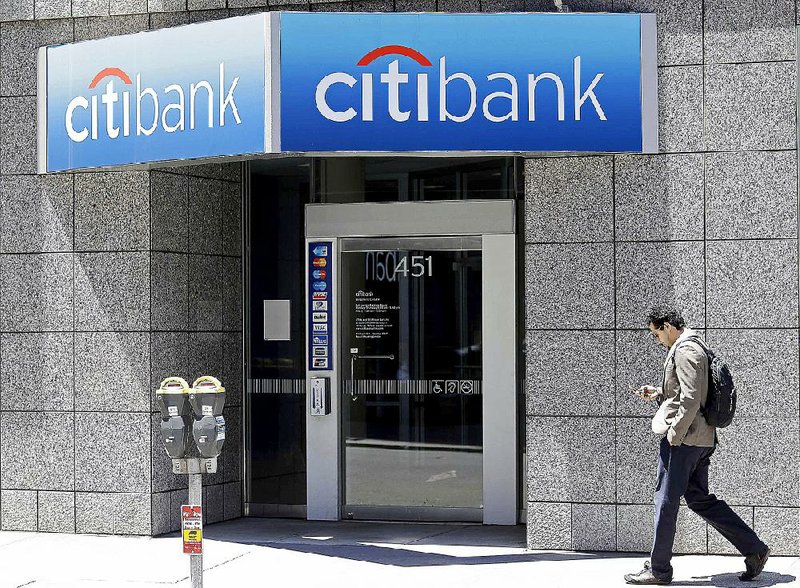NEW YORK -- Citigroup's profits rebounded in the second quarter from the same period a year ago, when the bank recorded a multibillion-dollar legal settlement with regulators.
The bank said Thursday that it earned $4.57 billion after payments to preferred shareholders as the bank cut expenses across the board, sharply higher than the $102 million it earned a year earlier.
Citi's second-quarter profits were basically erased last year after the bank recorded $3.8 billion in costs related to settling charges over its role in the housing bubble and subsequent financial crisis.
On a per-share basis, Citi earned $1.51, compared with 3 cents a year earlier. Adjusted earnings were $1.45 a share, due to a 6-cent accounting adjustment tied to the value of Citi's debt holdings, but that still beat the $1.35 per share that financial analysts were expecting.
Citi's global consumer banking division, which includes Citi's U.S. retail banking chain, credit cards, as well as its consumer banking business in Latin America and Asia, had net income of $1.63 billion. That's up 4 percent from a year ago, helped by a drop in expenses.
Like Bank of America and JPMorgan Chase, Citi has been looking to cut expenses in its consumer banking division through branch closures, layoffs and other measures. The bank had 15 percent fewer branches than it did a year ago, Citi said.
Citi saw a drop in trading revenue compared with the first quarter, in line with other major banks, as financial markets became less volatile. Fixed income, currency and commodity trading revenue declined 12 percent from the first quarter to $3.06 billion, while stock trading revenue fell 25 percent.
Citi Holdings, the bank's so-called bad bank that holds the bad mortgages and other toxic securities left over from the financial crisis, made a modest profit in the quarter of $157 million, compared with the $3.4 billion loss the business had a year ago.
Citi has been winding down and selling off assets in Citi Holdings for several years. Since last year, the division has been making small profits each quarter. Assets in Citi Holdings were $116 billion, down 22 percent from a year earlier.
Under Chief Executive Officer Michael Corbat, Citi has been trying to become a slimmer, more efficient company, and so far, the strategy is working. The bank passed the Federal Reserve's so-called stress test earlier this year, after failing in 2014. Citi raised its quarterly dividend to 5 cents a share in March, the bank's first increase since the 2008 financial crisis.
"Through active expense and balance sheet discipline, we are on track to reach our financial targets for the year," Corbat said in a statement.
Net revenue at the bank totaled $19.47 billion, compared with $19.43 billion in the same period a year earlier.
Citigroup's stock rose $2.13, or 3.8 percent, to close Thursday at $58.59.
Goldman Sachs Group Inc. also reported quarterly earnings Thursday. The bank said its profit nearly halved in the second quarter as it wrestled with choppy markets and had to put aside more money to deal with investigations stemming from the financial crisis.
The bank earned $1 billion, or $1.98 a share, down from $2 billion, or $4.10 a share, a year ago. Analysts polled by Thomson Reuters had expected earnings of $3.89 a share.
Like other banks that have reported their earnings this quarter, Goldman Sachs saw a broad slowdown in business since its strong first quarter this year.
The Goldman Sachs bankers who advise on mergers and acquisitions brought in revenue that was down 15 percent from the first quarter, but up 62 percent from a year ago.
At the fixed-income trading desks, which have traditionally been a major source of profit for Goldman, revenue fell 49 percent from the first quarter and 28 percent from the quarter a year ago.
In a statement, the bank's chief executive, Lloyd Blankfein, said the "uncertainty" in Europe, where the prospect of a Greek exit from the eurozone has loomed, "weighed on investors' level of conviction."
The bank's overall revenue was down 1 percent from a year earlier, to $9.1 billion, which was still slightly better than the $8.8 billion anticipated by analysts.
The big hit to Goldman's overall results came from the $1.45 billion that the bank put aside for "mortgage-related litigation and regulatory matters." Goldman is said to be in the final stages of reaching a deal with the Justice Department over the bank's sale of mortgage-backed securities before the financial crisis. Most other large banks have already settled similar cases.
Goldman Sachs shares fell $1.78 to close Thursday at $211.18.
Information for this article was contributed by Ken Sweet of The Associated Press; by Nathaniel Popper of The New York Times; and by Dakin Campbell of Bloomberg News.
Business on 07/17/2015
